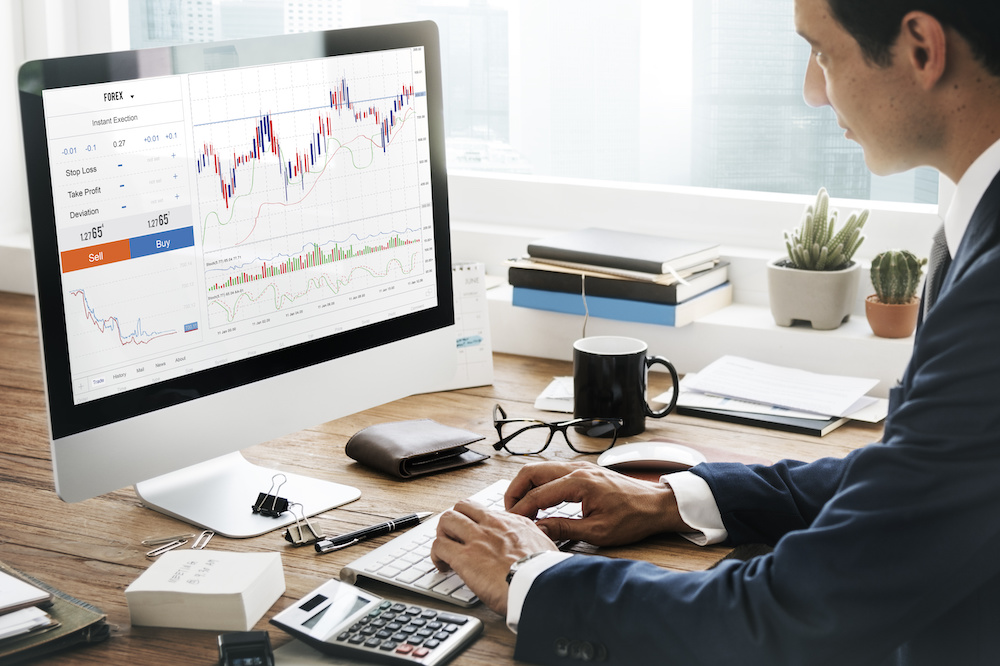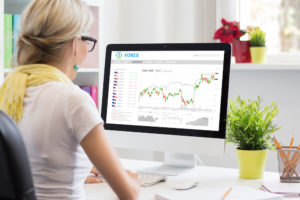Pros and Cons of Forex Trading: Important Facts

Like many types of trading, the pros and cons of Forex trading can vary.
You’ll find a collection of favorable and unfavorable events, which means you need to consider its benefits and disadvantages.
Let’s explore Forex trading risks, as well as their advantages, to help you decide if it’s an appropriate market for you.
What Is Forex Trading?
Forex is home to the largest market worldwide, with daily trading volumes upwards of five trillion dollars.
It’s short for Foreign Exchange, which means it’s trading one currency for another currency.
This process could occur for several reasons, whether it be tourism, foreign commerce, or trading.
With Forex trading, you’ll be exchanging one currency for another, which means you’ve likely experienced it before.
For example, if you’ve taken a trip overseas and exchanged your money for a local currency.
Apart from currency conversions, this market also deals with forwards, futures, and options.
When you’re interested in delving into the Forex market, you’ll have to take the global economy and other events into account.
Traders will often consider geopolitical events, for example, to determine if trading a specific pair is worth it.
They will also need to think about interest rate risks and diversifying their portfolios with different currencies.
Who Trades Forex?
Four main groups trade Forex for many reasons ranging from banks to individual traders.
Let’s delve into each group and why they’re interested in the foreign exchange market.
Commercial Banks
Banks are an essential part of trading, as they allow individuals to complete transactions with other companies and individuals.
Specifically, regarding Forex, commercial banks assist businesses with transacting with companies worldwide.
As an example, imagine you live in the United States and want to sell almonds to India, converting from USD to rupees.
Working with a commercial bank would include the following steps:
- The bank sells your U.S. dollars and buys rupees if they don’t already have some in stock.
- The rupees are then sold at the current exchange rate.
- The bank makes its profit in the difference between the bid and asking price for the said currency.
You’ll find that commercial banks can trade on behalf of their customers as well as themselves.
They’ll have an extensive collection of clients’ portfolios they’ll be responsible for with larger banks.
Commodity Sellers, Traders, and Buyers
The second group of people involved in foreign exchange is commodity traders, sellers, and buyers.
These individuals are typically responsible for managing the financial arrangements between buyers and sellers in common currencies.
It’s also common for sellers, traders, and buyers to analyze another country to determine financial risk.
You might also come across these professionals if you’re paying for services in another country, such as labor.
Sellers, traders, and buyers can assist you with paying for expenses worldwide.
Investment and Hedge Funds
One of the more well-known financial groups involved in Forex trading is an investment and hedge fund.
They have a slightly similar position as commercial banks, where they manage specific client’s portfolios.
Hedge funds help clients with the highest net worth trade for pension funds and other international currencies.
Investment funds can also be beneficial to help you better understand global financial risks.
For example, if you have stocks exposed to fluctuation, your hedge fund manages currencies to help offset the changes.
Traders
Traders have a job description that’s similar to banks and hedge funds alike.
They will complete personalized analyses of international financial markets and trade currencies.
You’ll find the primary purpose of their job is to offset international stock holding risks by trading currencies.
If you decide to work with a Forex mentor, you’ll likely be working alongside a professional trader.
Using their unique insight, you can work towards making more positive financial decisions.
The more experienced the trader, the better and more successful their strategies will be.
How Difficult Is Forex?
Working with this market can be challenging, especially since there are plenty of Forex trading risks to consider.
It’s important to remember when dealing with the foreign exchange market, you’re working against huge entities, like governments.
Even further, you’ll be put against significant odds when it comes to public health, weather, politics, and more.
The best way to make the most out of Forex trading is to manage your risk accordingly to prevent your finances from being wiped.
It’s also essential to conduct regular research to improve your trading skills and styles while developing new strategies.
You can guarantee that you’ll never stop learning when it comes to being a Forex trader.
Is It Worth It To Trade Forex?
As with any type of trading, it’s important to consider the Forex trading pros and cons, starting with the advantages.
When handled properly, working with the foreign exchange market can be pretty profitable and an attractive opportunity.
Some of the most prevalent advantages of the foreign exchange market include:
Fast Returns
If you’re looking for an opportunity with fast returns, it’s possible with Forex trading.
It’s a fast-moving market with plenty of liquidity, allowing traders to access higher leverage for faster returns.
With that said, if you’re focusing primarily on organic growth, it can take a little bit longer.
Accessibility
You’ll find that this market is one of the most accessible globally, especially for individual traders.
It’s easy enough to create an account within three days and begin trading with minimal startup costs.
If you prefer to use a brokerage, you can typically do so online and access real-time data.
As another benefit, the Forex market is open 24 hours a day, Monday through Friday, making it easy to fit into your schedule.
Depending on how you trade, this could be seen as one of the many Forex pros and cons.
Liquidity
As mentioned, the foreign exchange features deep liquidity, which is one of its most appealing features.
Regarding volume, it’s the largest in the world, mainly if you’re focusing on major currencies.
If you work with a brokerage, you’ll often be provided with a significant amount of liquidity.
You’ll find this benefit will give you access to better leverage and the ability to invest more freely.
Also, it’s a fantastic advantage for beginners, as you have a moderate likelihood of seeing returns.
Less Insider Price Manipulation
When compared to stocks, commodities, and bonds, the Forex is less centralized.
This approach helps make it far less likely to be affected by insider information, such as info from stakeholders.
With the Forex, most of the entities that could have inside information are heavily regulated to maintain market transparency.
Fewer Hidden Fees
When trading in this market, your costs are calculated based on a bid-ask spread.
All of the numbers in bid-ask spreads are provided in real-time by brokers, rather than adding hidden fees.
For example, you could find hidden fees and pricey commissions with equities, mutual funds, and bonds.
When you open an account and begin trading, you’ll know all of your costs upfront.
This feature is another reason why it’s one of the more transparent markets worldwide.
Automated Processes
It can be challenging to invest all of your spare time in managing your investments.
There are a significant number of automated processes explicitly developed for Forex trading.
You should have automatic trades, stop-loss limits, and have your trading platform manage your finances.
If you spend enough time researching potential strategies for your trading needs, you can set up the perfect automated process.
Regardless of the day-to-day swings, your portfolio will be optimized to ensure you’re making the most of your investment.
You’ll also find automated processes make trading in a highly fluctuating avenue less exhausting.
Learning Opportunities
As we had mentioned, there’s plenty to learn about the foreign exchange market, and it’s continually changing.
If you’re the type of person seeking a skill that you want to refine, this is one of the best options to consider.
With resources like the Price Action Traders Institute, you can keep your trading skills and knowledge regularly updated.

What Are the Disadvantages of Forex Trading?
With all of the foreign exchange market advantages, it can be tempting to dive head-first and open an account.
However, it’s also important to consider the trading risks before you get started.
As the next step of analyzing Forex trading pros and cons, let’s discuss the disadvantages.
Increased Volatility
Regardless of what market you get into, you’ll find there’s some level of volatility to take under advisement.
However, the Forex is also one of the more volatile options for you to consider.
The majority of traders are searching for short-term profits, which also exposes them to extreme volatility.
You’ll find numerous reports of people’s portfolios performing well, only for them to tank ten minutes later.
This concern is one of the primary reasons individuals set up automated processes or work with hedge funds.
Not Ideal for Small Traders
It’s easy to open an account with limited funds, but it’s not as beneficial as being a significant player.
Remember, the Forex is home to over five trillion USD being traded daily, with the majority sold by large financial institutions.
Unfortunately, this issue means some big traders are already established and well ahead of the game.
These large financial institutions have access to the latest trading technologies and have an advantage when setting prices.
If you want to stay above water, you’ll need to be able to adapt to the fast-changing movements throughout the day.
Fewer Residual Returns
The best way to determine if this market is right for you or not is to compare it to other standard options.
When looking at stocks and bonds, the Forex has significantly fewer residual returns over time.
Stocks and bonds typically provide dividend and interest payments that make them more appealing over the long term.
On the other hand, Forex trading is primarily based on capital gains as quickly as possible rather than long-term.
You won’t find that you’ll acquire as much consistency with this type of trading as you would with others.
Still, some individuals hold their positions overnight, which can provide rollover interest.
Fewer Regulatory Protections
The Forex market is somewhat transparent, thanks to public scrutiny, but it’s also an over-the-counter market.
With OTC markets, trades aren’t conducted in a centralized database, which can limit regulatory oversight.
Each trader will be responsible for investigating the reputation of their broker before signing up for an account.
There have been several situations where individuals have settled with poor brokerages and wound up losing significant sums.
You’ll want to ensure that you closely review a company’s trading practices before agreeing to hold an account.
It’s also important to note that you will be putting your money with an international brokerage.
Depending on the local rules and governances of that location, you might have fewer recourse options in the event of an issue.
Hidden Volume
One of the more unique aspects of the foreign exchange market is that it doesn’t readily show volume traded.
If you’re a highly analytical person, this could be a significant disadvantage, as it limits the amount of information you can use.
For example, you cannot review points of control, order flow, and other indications to help you strategize.
Can You Get Rich by Trading Forex?
It’s impossible to say that you can’t get rich by trading Forex, as there are financial advantages of the foreign exchange market.
However, all of the Forex pros and cons suggest that this is the type of market that requires skill.
Otherwise, you could become one of the 90% that lose a significant amount of money through lack of discipline.
You’ll be experiencing prominent trends, which can be intimidating, especially with the size and liquidity of the market.
If you want to diversify your trading skills with a higher level of risk, Forex can be profitable the more you learn.
Pros and Cons of Forex Trading: Final Thoughts
With any type of monetary investment, there are advantages and disadvantages.
Before jumping into the deep end, it’s always beneficial to consider the pros and cons of Forex trading, as they’re significant.
With the right amount of knowledge, patience, and strategizing, you could make a substantial sum off your investments.




